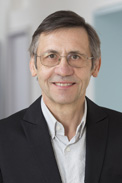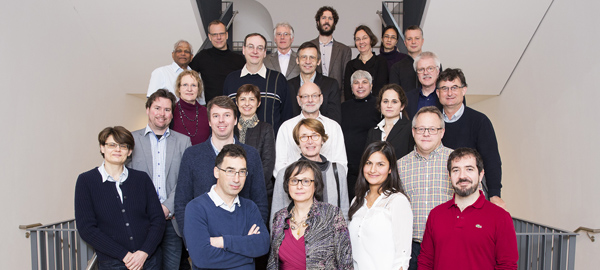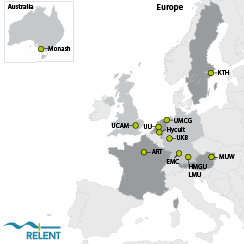 |
|
|
PD Dr. Dieter E. JennePrincipal Investigator Phone: +49 89 3187 4664 Fax: +49 89 3187 4661
|
HelmholtzZentrum München,
|
|
 |
 |
Dr. Therese DauPostdoctoral fellow |
Jessica GötzfriedDoctoral fellow |
The HelmholtzZentrum München (HMGU) is a research institution within the Helmholtz Association of German Research Centers, the largest scientific organisation in Germany (36,000 employees in 18 research centers). HelmholtzZentrum München employs approximately 2200 people of 50 different nationalities (more than three quarters of those acting in science). As a leading center of health research in three major areas of human diseases, diabetes mellitus, chronic lung diseases and neurodegeneration, with a focus on Environmental Health, HMGU pursues the goal of developing personalized medical approaches for the prevention and therapy of major common diseases. Researchers of the HMGU investigate the interaction of genetics, environmental factors and lifestyle and utilize their insights to develop new approaches for individualized diagnostics, treatment and prevention of major common diseases. The so-called Comprehensive Pneumology Center (CPC) of the HMGU focuses on lung diseases and is headed by two chair persons, representing the two areas of Experimental Pneumology (Prof. Oliver Eickelberg) and Clinical Pneumology (Prof. Dr. Jürgen Behr, Director of the Medical Clinic and Policlinics V). Scientists of the CPC cooperate with clinicians of the LMU University hospitals and the Asklepios-Fachkliniken München-Gauting.
Main tasks attributed in the project
Partner HMGU will lead WP 04 - Pathogenic role of T-cells and their interactions with myeloid cells.
Main personnel involved in the project
Dieter E. Jenne (M.D., Privatdozent) is a staff scientist of the Max-Planck-Institute of Neurobiology and a guest scientist at the HMGU/CPC since 01.06.2012, when he moved his laboratory from the Max-Planck-Institute of Neurobiology to the Institute of Lung Biology and Disease (iLBD) of the HelmholtzZentrum München. He received his Dr. med and Dr. habil from the University of Heidelberg in 1984 and 1990 and his venia legendi in 2003 from the Ludwig-Maximilians University in Munich. He was a postdoctoral research fellow at the EMBL in Heidelberg in the cell biology program of Dr. K. Simons and in Prof. Dr. Jürg Tschopp’s team at the Institute of Biochemistry, University of Lausanne. In 1992, he was selected for a staff scientist position at the Max-Planck-Institute of Neurobiology.
Dr. Jenne discovered the relevant target antigen, PR3, in Wegener’s granulomatosis (Nature, 1990) and thereby laid the foundations for a widely accepted laboratory autoantibody test in the clinics. He reported the pathogenic role of neutrophil extracellular trap formation in autoantibody-mediated focal necrotizing glomerulonephritis and systemic vasculitis in 2009 in a highly cited Nature medicine paper (278 citations). He is an acknowledged expert for lymphocyte (granzymes) and neutrophil serine proteases and inhibitors in autoimmune vasculitis and chronic inflammatory disease, explores the pathogenic role of proteases in various mouse models, and produced his own knock-out and humanized knock-in lines to elucidate substrate-function-relationships and autoantibody effects in vivo. He pursues a long-lasting research program on Wegener’s granulomatosis, a chronic relapsing disease, which is characterized by an autoimmune response against human proteinase 3, one of the four neutrophil serine proteases. He is also very experienced in large scale preparations of functionally active and natively folded serine proteases and serine protease inhibitors (serpins) and in thermophoretic measurements of protein interactions under equilibrium conditions in complex biological fluids.









